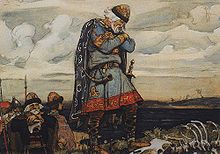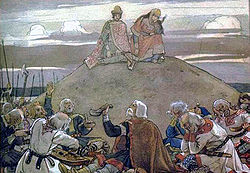- Oleg of Novgorod
-
Oleg the Seer Grand Prince of Rus' 
Oleg of Novgorod by Vasnetsov Reign 879–912 Predecessor Rurik Successor Igor Died 912 Burial Kiev or Old Ladoga Religion Paganism Oleg of Novgorod (Slavic: Олег, Old Norse: Helgi) was a Varangian prince (or konung) who ruled all or part of the Rus' people during the early 10th century.
He is credited with moving the capital of Rus' from Novgorod the Great to Kiev and, in doing so, he laid the foundation of the powerful state of Kievan Rus'. He also launched at least one attack on Constantinople, capital of the Byzantine Empire. According to East Slavic chronicles, Oleg was supreme ruler of the Rus' from 882 to 912. This traditional dating has been challenged by some historians, who point out that it is inconsistent with such other sources as the Schechter Letter, which mentions the activities of certain khagan HLGW of Rus' as late the 940s, during the reign of Byzantine Emperor Romanus I. The nature of Oleg's relationship with the Rurikid ruling family of the Rus', and specifically with his successor Igor of Kiev, is a matter of much controversy among historians.
Contents
Oleg of the Russian chronicles
According to the Primary Chronicle, Oleg was a relative (likely brother-in-law) of the first ruler, Rurik, and was entrusted by Rurik to take care of both his kingdom and his young son Ingvar, or Igor. Oleg gradually took control of the Dnieper cities, captured Kiev (previously held by the Varangian warlords, Askold and Dir) and finally moved his capital from Novgorod there. The new capital was a convenient place to launch a raid against Tsargrad (Constantinople) in 911. According to the chronicle, the Byzantines attempted to poison Oleg, but the Rus' leader demonstrated his oracular powers by refusing to drink the cup of poisoned wine. Having fixed his shield to the gate of the imperial capital, Oleg won a favourable trade treaty, which eventually was of great benefit to both nations. Although Byzantine sources did not record these hostilities, the text of the treaty survives in the Primary Chronicle.
 Viktor Vasnetsov. Oleg being mourned by his warriors (1899).
Viktor Vasnetsov. Oleg being mourned by his warriors (1899).
The Primary Chronicle's brief account of Oleg's life contrasts with other early sources, specifically the Novgorod First Chronicle, which states that Oleg was not related to Rurik, and was rather a Scandinavian client-prince who served as Igor's army commander. The Novgorod First Chronicle does not give the date of the commencement of Oleg's reign, but dates his death to 922 rather than 912.[1] Scholars have contrasted this dating scheme with the "epic" reigns of roughly thirty-three years for both Oleg and Igor in the Primary Chronicle.[2] The Primary Chronicle and other Kievan sources place Oleg's grave in Kiev, while Novgorodian sources identify a funerary barrow in Ladoga as Oleg's final resting place.[3]
Legend of the death of Oleg the Prophet
In the Primary Chronicle, Oleg is known as the Prophet (вещий), an epithet alluding to the sacred meaning of his Norse name ("priest"), but also ironically referring to the circumstances of his death. According to this legend, romanticised by Alexander Pushkin in his celebrated ballad "The Song of the Wise Oleg,"[4] it was prophesied by the pagan priests that Oleg would take death from his stallion. Proud of his own foretelling abilities, he sent the horse away. Many years later he asked where his horse was, and was told it had died. He asked to see the remains and was taken to the place where the bones lay. When he touched the horse's skull with his boot a snake slithered from the skull and bit him. Oleg died, thus fulfilling the prophecy. In Scandinavian traditions, this legend lived on in the saga of Orvar-Odd.
Helgu of the Schechter Letter
According to the Primary Chronicle, Oleg died in 912 and his successor, Igor of Kiev, ruled from then until his assassination in 945. The Schechter Letter,[5] a document written by a Jewish Khazar, a contemporary of Romanus I Lecapenus, describes the activities of a Rus' warlord named HLGW (Hebrew: הלגו), usually transcribed as "Helgu".[6] For years many scholars disregarded or discounted the Schechter Letter account, which referred to Helgu (often interpreted as Oleg) as late as the 940s.[7]
Recently, however, scholars such as David Christian and Constantine Zuckerman have suggested that the Schechter Letter's account is corroborated by various other Russian chronicles, and suggests a struggle within the early Rus' polity between factions loyal to Oleg and to the Rurikid Igor, a struggle that Oleg ultimately lost.[8] Zuckerman posited that the early chronology of the Rus' had to be re-determined in light of these sources. Among Zuckerman's beliefs and those of others who have analyzed these sources are that the Khazars did not lose Kiev until the early 10th century (rather than 882, the traditional date[9]), that Igor was not Rurik's son but rather a more distant descendant, and that Oleg did not immediately follow Rurik, but rather that there is a lost generation between the legendary Varangian lord and his documented successors.[10]
Of particular interest is the fact that the Schechter Letter account of Oleg's death (namely, that he fled to and raided FRS, tentatively identified with Persia,[11] and was slain there) bears remarkable parallels to the account of Arab historians such as Ibn Miskawayh, who described a similar Rus' attack on the Muslim state of Arran in the year 944/5.[12]
Attempts to reconcile the accounts
 Prince Oleg Approached by Pagan Priests, a Kholuy illustration to Pushkin's ballad.
Prince Oleg Approached by Pagan Priests, a Kholuy illustration to Pushkin's ballad.
In contrast to Zuckerman's version, the Primary Chronicle and the later Kiev Chronicle place Oleg's grave in Kiev, where it could be seen at the time when these documents were compiled. Furthermore, scholars pointed out that, if Oleg succeeded Rurik in 879 (as the East Slavic chronicles assert), he could hardly have been active almost 70 years later, if his was not a case of longevity otherwise unheard of in medieval annals. To solve these difficulties, it has been proposed that "helgu", standing for "holy" in Norse language, was a hereditary title of the pagan monarchs-priests of Rus' and that this title was held by Igor, among others.[13]
It has also been suggested that Helgu-Oleg who waged war in the 940s, was distinct from both of Rurik's successors. He could have been one of the "fair and great princes" recorded in the Russo-Byzantine treaties of 911 and 944 or one of the "archons of Rus" mentioned in De administrando imperio.[14] Regrettably, the Primary Chronicle does not specify the relations between minor Rurikid princes active during the period, although the names Rurik, Oleg, and Igor were recorded among the late-10th-century and 11th-century Rurikids.
Georgy Vernadsky even identified Oleg of the Schechter Letter with Igor's otherwise anonymous eldest son, whose widow Predslava is mentioned in the Russo-Byzantine treaty of 944.[15] Alternatively, V. Ya. Petrukhin speculated that Helgu-Oleg of the 940s was one of the vernacular princes of Chernigov, whose ruling dynasty maintained especially close contacts with Khazaria, as the findings at the Black Grave, a large royal kurgan excavated near Chernigov, seem to testify.[16] Neither of these theories has been endorsed in the academic mainstream, however.
See also
- List of Ukrainian rulers
- List of Russian rulers
References
- ^ A. N. Nasonov, Novgorodskaia Pervaia Letopis Starshego i Mladshego Izvodov, (Moscow and Leningrad: ANSSR, 1950),109. cf. Kloss 337-343.
- ^ Shahmatov xxxii-xxxiii.
- ^ The earliest and most believable version seems to have been preserved in the Novgorod First Chronicle, which says that Oleg departed "overseas" (i.e., to Scandinavia) and was buried there.
- ^ Leningrad, Aurora Art Publishers, 1991.
- ^ The text of the Schechter Letter is given at Golb 106-121. It is cited herein by folio and line (e.g. SL Fol. x:x)
- ^ SL Fol. 2r, 15-16; 17. The author of the letter describes Khazaria as "our land". SL Fol. 1r:19, 2v:15,20.
- ^ No less a personage than Mikhail Artamonov declared the manuscripts' authenticity beyond question. Artamonov 12. Nonetheless, other scholars expressed scepticism about its account, due in large part to its contradiction of the Primary Chronicle. E.g., Gregoire 242-248, 255-266; Dunlop 161. Novoseltsev, noting the discrepancy, admits the document's authenticity but declares that the author "displaces the real historical facts rather freely." Novoseltsev 216-218. Brutskus asserted that HLGW was in fact another name for Igor. Brutskus 30-31. Mosin proposed that HLGW was a different person from Oleg and was an independent prince in Tmutarakan; the existence of an independent Rus' state in Tmutarakan in the first half of the tenth century is rejected by virtually all modern scholars. Mosin 309-325; cf. Zuckerman 258.
- ^ Zuckerman 257-268. Zuckerman cites, inter alia, to the Novgorod First Chronicle. Cf., e.g., Christian 341-345.
- ^ Pritsak 60-71; Shahmatov xxxii-xxxiii;
- ^ Pritsak 60-71. Pritsak placed the "lost generation" between Oleg and Igor. Zuckerman dismisses this as "outright speculation"; and places both as contemporaries in the early to mid tenth century.
- ^ Pavel Kokovtsov, when publishing a Russian translation of the letter in 1932, argued that FRS may refer to Thrace, where the Rus' forces were defeated by the armies of Lecapenus (online).
- ^ Miskawaihi 67-74; cf. SL Fol. 2v:3 et seq.
- ^ Parkhomenko 24 et seq.
- ^ Brook 154.
- ^ Vernadsky 41 et seq.
- ^ Petrukhin 226-228.
Sources
- Artamonov, Mikhail. Istoriya Khazar. Leningrad, 1962.
- Brutskus, Julius D. Pismo Hazarskogo Evreja Ol X Veka. Berlin 1924.
- Christian, David. A History of Russia, Central Asia and Mongolia, Vol. 1. Blackwell, 1998.
- Dunlop, D.M.. History of the Jewish Khazars. Princeton: Princeton Univ. Press, 1954.
- Gregoire, H. 'Le "Glozel' khazare." Revue des Études Byzantines 12, 1937.
- Golb, Norman and Omeljan Pritsak. Khazarian Hebrew Documents of the Tenth Century. Ithaca: Cornell Univ. Press, 1982. [Note:as each author was responsible for separate sections of the work, they are referenced separately above.]
- Kloss, B.M. "Letopis' Novgorodskaja pervaja". Slovar' Kniznikov i Knizhnosti Drevnej Rusi, vol. 1. Leningrad 1987.
- Kokovtsov P.S. Еврейско-хазарская переписка в X веке. Leningrad 1932.
- al-Miskawaihi. The Eclipse of the 'Abbasid Caliphate. D. S. Margoliouth, trans. Oxford 1921.
- Mosin, V. "Les Khazars et les Byzantins d'apres l'Anonyme de Cambridge." Revue des Études Byzantines 6 (1931): 309-325.
- Nasonov, A.N., ed. Novgorodskaja Pervaja Letopis Starshego i Mladshego Izvodov. Moscow, 1950.
- Novoseltsev, Anatoli P. Hazarskoe Gosudarstvo i Ego Rol' v Istorii Vostochnoj Evropy i Kavkaza. Moscow 1990.
- Parkomenko V.A. У истоков русской государственности. Leningrad, 1924.
- Petrukhin V.Ya. "Князь Олег, Хелгу Кембриджского документа и русский княжеский род". Древнейшие государства Восточной Европы. 1998. Памяти А.П. Новосельцева. Moscow, Russian Academy of Sciences, 2000: 222-230.
- Pushkin, Alexander. The Song of the Wise Oleg. Leningrad, Aurora Art Publishers, 1991.
- Shahmatov, A.A. Ocherk Drevnejshego Perioda Istorii Russkogo Jazyka. Petrograd, 1915 (reprinted Paris 1967).
- Zuckerman, Constantine. "On the Date of the Khazar’s Conversion to Judaism and the Chronology of the Kings of the Rus' Oleg and Igor." Revue des Études Byzantines 53 (1995): 237-270.
- Vernadsky, Georgy. Kievan Rus. Moscow, 1996.
Preceded by
RurikPrince of Novgorod
879–912Succeeded by
IgorPreceded by
Askold and DirPrince of Kiev
882–912Categories:- History of Ukraine
- Russian leaders
- Princes of Novgorod
- Rulers of Kievan Rus'
- Rus
- History of Russia
- Viking Age monarchs
- 912 deaths
- Rurik Dynasty
- 10th-century Russian princes
- 9th-century births
Wikimedia Foundation. 2010.


